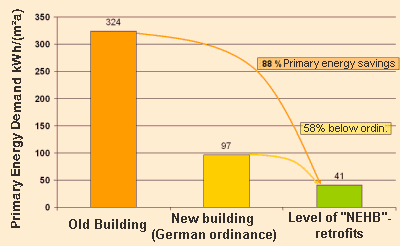| WG VII: Regional Networks promoting Refurbishment Energy is consumed in a decentralized way. Supply is organised by globally centralized sources. The Passive House concept has shown that the amount of the energy consumption can be influenced to a great deal by intelligent energy technology. Implementing such means of energy efficiency has to take place where the need of energy originates – therefore on-site in the regions. With realising projects to increase energy efficiency, at the same time investments in the region are coming along. A most welcome effect when we take a look at the current economical situation. Yet alone on this account in some regions of Austria and Germany initiatives emerged which aim to intensify the implementation of energetic modernisation measures. Christian Stolte shows in his lecture the “Potentials of Energetic Refurbishment with Passive House Components”, and talks about gained experiences in the dena (German Energy Agency) model project ”Low-Energy House in the Building Stock” and gives an overview of initiated projects in Germany. Passive House components make a strong contribution to energetic improvements in the refurbishment of already existing buildings as well. By means of these components thermal comfort and housing quality are increased. For housing companies the market value will increase in the long run. And the dependence on increased energy costs can be reduced.
Looking at the region of Nuremberg, Erich Maurer exemplifies how intensified implementation can be activated: „Research Project EnergyRegion Factor10”. Within the two years of the programme, the project team carries out optimisation of components, interfaces and building site procedures at different exemplary objects. Thanks to this optimisation, high standards can be realised at as favourable costs as possible. The aim is to reduce the additional costs for energetic improvements to 100 €/m²in comparison to EnEV (the current German ordinance). Günter Lang illustrates the Austrian success in “Successful networking for Passive Houses”. Based on the foundation of IG Passive House Voralberg in 2001, nowadays 6 regional communities of interest in 8 different states with about 190 member companies in total syndicated and action for supporting Passive Houses are coordinated by the umbrella organisation IG Passive House Austria. Thanks to their joint appearance, the young Passive House scene is permanently present in public and organises further training, marketing- and information events throughout Austria. The implementation of research projects, in particular within the scope of” House of the Future” programmes, provides important impulses. Martin Sambale introduces in his lecture “Consulting- Partner- Implementation” the multi-plane strategy in the Allgaeu. Energetically optimised buildings and refurbishment in the Allgaeu is pushed very successfully by eza! (the Energy (z)Center of Allgäu),offering a mix of different services and activities. One emphasis was put on Passive House and Factor-10 refurbishments. Thanks to this effort, up to 55 million € of additional investments could be initiated in the years 2001 to 2004. Manfred Görg is illustrating “Think
globally - act concrete" and the notion of
regional initiatives by introducing the Hanoverian climate protection
region. The availability of Passive House components is providing
the technical and economical preconditions. Only comprehensive energetic
modernisation geared towards future requirements is living up to
the demands of sustainable development. The PHI is
not responsible for the content of linked web-pages. |
| Download | |
| > | .2006-02-17 |
| > | 2005-08-14 Folder of the 10th International Conference on Passive Houses (fanfold)  PDF 248 kb PDF 248 kb |
